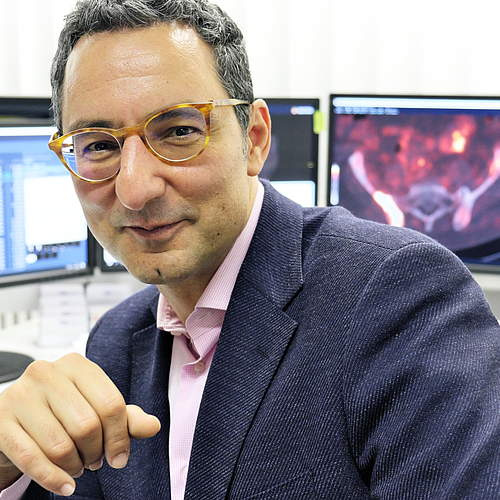
Samer Ezziddin, Biography
After graduation from Medical School in Frankfurt a.M. / Germany in 1997, Samer Ezziddin went on to a one-year residency in Medicine and Endocrinology at the University of Cologne. He passed the USMLE including the Clinical Skills Assessment in Philadelphia/MA, and achieved full ECFMG certification in 1999. During his residency and subsequent time as Assistant Medical Director in Nuclear Medicine at the University of Bonn he introduced 177Lu-based peptide receptor radionuclide therapy (PRRT) in 2004 and developed the targeted therapy program. After an externship in Interventional Oncology at Northwestern University / Chicago (Prof. Salem), he restructured and expanded the Radioembolization routine at his institution during his Deputy Director period in Bonn (2008-2014), achieving the first European dual-license for Resin and Glass Microsphere Radioembolization, and introduced intra-arterial PRRT. His German PhD (Habilitation) in Nuclear Medicine focused on outcome predictors in PRRT. He is a well recognized international expert on neuroendocrine tumors and targeted radionuclide therapy and has extensively published in the area of dosimetry and molecular imaging for planning and monitoring radioembolization (SIRT). The master thesis of his accompanying studies in Medical Device Clinical Sciences (MSc) at the University of Bonn addressed the different impact of radioembolization devices. Other fields of expertise and activities involve thyroid & prostate cancer and multimodality imaging (PET-CT, SPECT-CT). Samer Ezziddin has contributed to various guidelines and task groups including commitments as member of the Radionuclide Therapy Committee of the European Association of Nuclear Medicine (EANM), the Therapy Committee and Guideline Committee of the German Society of Nuclear Medicine (DGN), the National Expert Group for Radioembolization (SIRTranet) and the Steering Committee for the CIRSE Registry for SIR-Microsphere Therapy (CIRT). Since August 2014 Professor Ezziddin is Head of the Nuclear Medicine Department at Saarland University Hospital. With his therapeutic focus in oncology and devotion to targeted treatment he aims at individualizing and optimizing radionuclide-based targeted tumor therapy. Under his direction, the University-based Dep. of Nuclear Medicine in Homburg became one of the leading institutions worldwide in the field of molecular targeted radionuclide therapy of advanced tumors.


